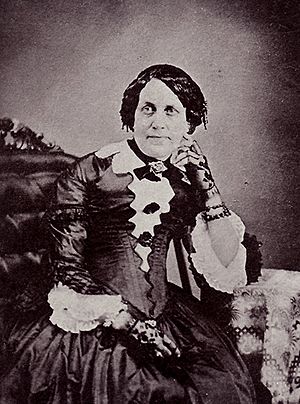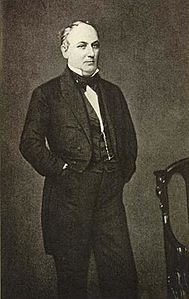Proslavery facts for kids
Proslavery means supporting slavery. People have supported slavery throughout history, from ancient times to more recent centuries. Before the American Civil War, many people in the United States supported it.
Arguments for slavery often included:
- Belief that the Bible and God approved of it.
- Idea that some people were "natural slaves" and needed guidance.
- Claim that slaves were sometimes better off than very poor free people.
- Belief that slavery benefited society as a whole.
- The fact that many great civilizations had practiced slavery for a long time.
Ancient Views on Slavery
People in ancient times had different ideas about slavery.
Jewish Views on Slavery
Ancient Jewish religious texts, like the Hebrew Bible, contained many laws about owning and treating slaves. These laws changed over time. For example, there were different rules for Hebrew slaves and non-Hebrew slaves. The laws also included punishments for slave owners who mistreated their slaves. Later, when people wanted to end slavery, some used these ancient laws to say that slavery was allowed by religion.
Greek Views on Slavery
The Greek philosopher Aristotle believed that some people were "slaves by nature." He thought these people were not able to care for themselves, and that being enslaved was actually best for them. Another Greek philosopher, Plato, also supported slavery in his writings.
Early Christian Views on Slavery
Most early Christian leaders believed that slavery was morally acceptable. For example, Augustine of Hippo thought that God allowed the punishment of disobedient slaves. Thomas Aquinas believed slavery was not part of nature, but he defended it as a result of human sin. He also thought it was needed for society's good.
Islamic Views on Slavery
Traditionally, Islam allowed slavery but had rules to make it more fair. Today, most Islamic leaders say that slavery does not fit into the modern world. However, a few still argue it is allowed, and some extremist groups practice it. An early Islamic philosopher, Al-Farabi, also supported the idea that some people were naturally slaves.
British Support for Slavery
The British pro-slavery movement worked against ending the slave trade from 1783 until it was stopped in 1807. Then, they opposed ending slavery itself in British colonies until it was made illegal in 1833. Many of these supporters owned plantations in the British West Indies and made money from slavery.
British supporters often used the Bible to defend slavery. For example, politicians like Isaac Gascoyne and George Hibbert gave speeches in Parliament, saying that the Old Testament allowed slavery. After the slave trade was abolished, they argued that the Bible allowed owning slaves, even if it didn't allow the slave trade.
John Locke's Ideas on Slavery
The philosopher John Locke wrote about slavery in his book Two Treatises of Government. He said that a person could not willingly choose to become a slave. However, he believed that enslaving people who had committed serious crimes or were captured in a fair war was acceptable.
Historians note that Locke himself was involved in the African slave trade. He even helped create laws that gave slave owners "absolute power" over their enslaved people. This seems to go against his own writings that criticized slavery as a "vile and miserable" condition.
American Support for Slavery

In the United States, support for slavery grew in the Southern states as the movement to end slavery became stronger in the late 1700s and early 1800s. Many books and essays were written to defend slavery. Some important writers included Zephaniah Kingsley, William Harper, James Henry Hammond, and Thomas Roderick Dew.
By the 1820s, a new idea about slavery appeared in the U.S. Supporters claimed that enslaved people could not care for themselves. They said that white people were chosen by God to look after the bodies and souls of Black people. Southern slave owners argued they were providing what Black people needed: care and protection.
Pro-slavery writers often claimed that enslaved people were treated well and were happy. One writer in 1835 even said that American slavery was the best form of slavery ever created.
The Movement to End Slavery in the U.S.
For many centuries, slavery was common around the world. Philosophers like Aristotle and John Locke accepted it as part of society. However, in the late 1700s, people in Europe began to argue against slavery. They used ideas from the Age of Enlightenment and moral arguments, especially from groups like the Quakers.
In North America, slavery became a big issue during the American Revolution. Northern states gradually ended slavery through laws or court cases. By 1810, most enslaved people in the North were free.
In the Southern states, the economy changed from tobacco to less labor-intensive crops like wheat. This led to more enslaved people being freed between 1783 and 1812. However, this changed quickly. The demand for sugar and cotton around the world grew, and the Louisiana Purchase opened up huge new lands for plantations. This made slavery much more profitable.
As the movement to end slavery grew, slaveholders and their supporters in the South began to strongly defend slavery. They argued that it was good for everyone involved.
Political Arguments for Slavery
Important political figures like James Henry Hammond and John C. Calhoun developed strong arguments for slavery. They believed that society needed a lower class to support the upper classes, like a "mudsill" (the lowest support beam) for a building. They thought that without slavery, there would be a large group of poor, landless people who could cause problems and instability in society.
These thinkers argued that slavery solved this problem by making all free people "citizens" and removing the "mudsill" class from politics by enslaving them. In their view, this protected society and kept it stable. They believed slavery was for the good of enslaved people, masters, and society as a whole.
These arguments also protected the wealth of slaveholders. At the time of the Civil War, enslaved people were a huge part of the South's wealth. Ending slavery was seen as a major threat to their powerful economy, which depended almost entirely on the plantation system and enslaved labor.
Christians Who Supported Slavery
Many passages in the Bible talk about slavery and how it should be managed. Because of this, many Christians throughout history used the Bible to justify owning slaves. When people suggested ending slavery, some Christians strongly opposed it, saying the Bible proved it was a normal part of life.
For example, George Whitefield, a famous Christian preacher, supported legalizing slavery in the Province of Georgia. He believed that Black people were naturally suited for hot climates and that Georgia needed enslaved labor to grow economically. He bought enslaved Africans for his plantation and orphanage. While he still believed in treating enslaved people kindly, he supported slavery for practical reasons.
Many Christians in both Europe and the United States went further, arguing that the Bible's words and teachings directly supported slavery.
[Slavery] was established by decree of Almighty God ... it is sanctioned in the Bible, in both Testaments, from Genesis to Revelation ... it has existed in all ages, has been found among the people of the highest civilization, and in nations of the highest proficiency in the arts.
... the right of holding slaves is clearly established in the Holy Scriptures, both by precept and example.
Because of disagreements over slavery, several Christian denominations in the U.S. split into Northern and Southern branches in the 1830s and 1840s. This included the Presbyterians, Methodists, and Baptists.
Proslavery Views in the 20th Century
Even in the 20th century, some people continued to discuss or support aspects of slavery. The American philosopher Robert Nozick wrote about "voluntary slavery," where people could choose to sell themselves into slavery.
Another figure, Rousas Rushdoony, believed that ancient Old Testament laws should still be used today, including those that allowed slavery. He even supported forcing people who rejected Christianity into slavery.
Jack Kershaw, a lawyer, famously said, "Somebody needs to say a good word for slavery."
Representative Howard W. Smith also defended slavery. He mentioned ancient civilizations like Ancient Egypt and Rome, claiming that slavery made them great.
See also
 | Aaron Henry |
 | T. R. M. Howard |
 | Jesse Jackson |


